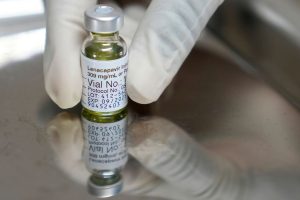HARARE, Zimbabwe (AP) — Eswatini on Tuesday became the first African country to receive lenacapavir, the first twice-yearly HIV prevention injection hailed by global health officials as a game-changer in the fight against a virus that has killed tens of millions of people across the continent.
Developed by Gilead Sciences, lenacapavir has demonstrated near-total protection in clinical studies. Its rollout, initially planned for 10 high-risk African countries, is part of the U.S. President’s Emergency Plan for AIDS Relief, or PEPFAR, in partnership with the Global Fund. By 2027, the initiative aims to benefit at least 2 million people in those countries.
Daniel O’Day, chair and CEO of Gilead Sciences, described the Eswatini rollout as “extraordinary” because “it’s the first time in history that a new HIV medicine is reaching a country in sub-Saharan Africa in the same year as approval of the United States” and because Eswatini “is the country with the highest incidence of HIV in the world.” The U.S. approved the drug in June.
The United States, whose deep cuts to foreign aid this year under President Donald Trump have severely impacted Africa’s health programs, initially planned to distribute 250,000 doses this year to the 10 countries. Zambia also received its first shipment Tuesday, while Gilead seeks regulatory authority in Botswana, Kenya, Malawi, Namibia, Rwanda, Tanzania, Uganda and Zimbabwe.
That was increased to 325,000 due to “early demand signs,” Brad Smith, senior advisor for the Bureau of Global Health Security and Diplomacy, told journalists.
The U.S. government has noted that over 25 million people across Africa are living with HIV.
In Eswatini, a tiny kingdom in southern Africa, about 6,000 high-risk people are set to benefit from the drug’s initial rollout, primarily to prevent HIV transmission from mothers to newborns. Home to roughly 1.2 million people, Eswatini currently has over 200,000 people living with HIV, with most receiving treatment funded by PEPFAR, Smith said.
Eswatini, the world’s last absolute monarchy with a documented record of human rights violations, is also among the African countries participating in Trump’s third-country deportation program, which has faced protests from rights groups.
In July, the World Health Organization approved lenacapavir as an additional HIV prevention option. UNAIDS has called long-acting injectables a “fresh option” amid concerns that foreign funding cuts could worsen infections.
South Africa’s health minister, Aaron Motsoaledi, recently called lenacapavir “groundbreaking” but raised concerns over limited supplies when South Africa begins its own rollout in April 2026.
Motsoaledi also welcomed Gilead’s steep price reduction from over $28,000 per person annually in the U.S. to approximately $40 for lower-income countries.
The rollout has fueled debate over access and manufacturing rights. Civil society groups in South Africa, sub-Saharan Africa’s most advanced economy, have criticized Gilead for excluding local manufacturers from voluntary licensing agreements despite the country’s role in clinical trials.
___
For more on Africa and development: https://apnews.com/hub/africa-pulse
The Associated Press receives financial support for global health and development coverage in Africa from the Gates Foundation. The AP is solely responsible for all content. Find AP’s standards for working with philanthropies, a list of supporters and funded coverage areas at AP.org.
By FARAI MUTSAKA
Associated Press

